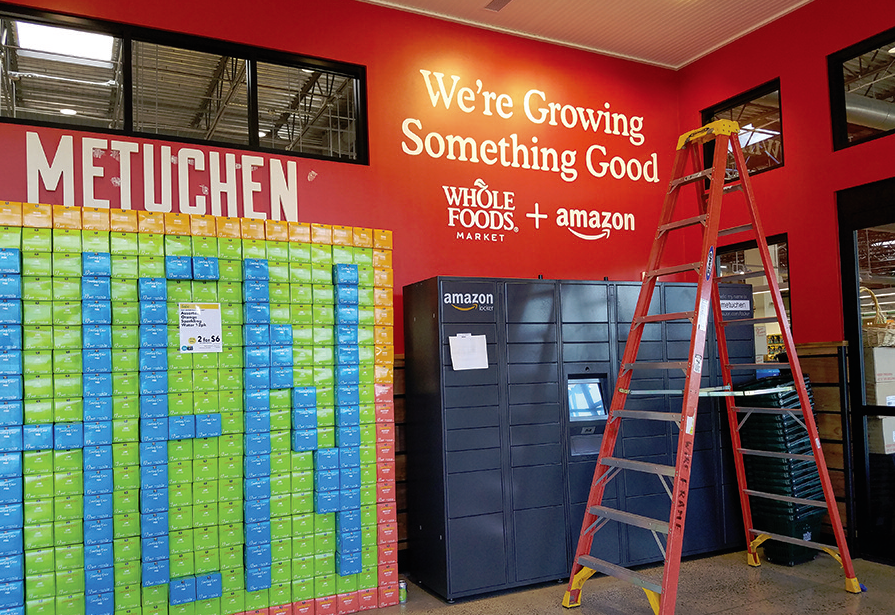
Report: Amazon Product Ideas Clash With Whole Foods Markets Standards

Internal debate is growing, according to the report. When asked if “consumer packaged goods like Coca-Cola” will be sold, spokesperson Brooke Buchanan told Yahoo Finance, “As you know, we have really high-quality standards, and those products that you just mentioned don’t meet those quality standards. If there were new products that actually do meet our quality standards, then there’s always that consideration.”
Responding to WholeFoodsMagazine's coverage, Buchanan stated, “Working together with Amazon has allowed us to lower some prices and bring our natural and organic food to more people, without compromising our industry-leading quality standards. While our culture will naturally evolve, the fundamentals of Whole Foods Market – our high quality standards and our Team Members’ passion, spirit of innovation, philanthropy and commitment to exceptional customer experience – will always be part of who we are and how we do business.”
Amazon refused to comment.
The news is not a complete surprise. Corinne Shindelar, executive director of theIndependent Natural Food Retailers Association, had said from the time of the deal’s announcement that what Amazon might turn Whole Foods Market into effectively eliminated it from the field as a natural and organic store. Already, electronics have been added, prices have been cut for Amazon Prime members, and free two-hour home delivery introduced in selected markets.
The retailer has caught flakas far back as 2009for carrying products that are not exactly organic – candy, for example, with CEO John Mackey acknowledging it.
Still, taking in a product that symbolizes as far as you can get on the scale from natural and organic could hasten the erosion of the brand. (Coke did introduce a competition inviting people to come up with a good-tasting natural sweetener.)
“Whole Foods has proved a specialty retailer focusing only on organic food can’t scale and be profitable,” Brittain Ladd, a retail and supply chain consultant, told Yahoo Finance. “Amazon doesn’t want to maintain the status quo. They can’t see people go elsewhere simply because these highly-popular products are not available in Whole Foods.”
“It’s painful, but Whole Foods needs to be put out of the comfort zone,” Neil Saunders, managing director of GlobalData Retail told Yahoo Finance. “There are retailers that can provide high-quality organic food while offer packaged goods, and Amazon is helping Whole Foods in that direction.”
Jay Jacobowitz, founder and president of Retail Insights, agrees. Regarding the addition of Coke to Whole Foods' shelves, he says, "How about let’s change the name of the store from Amazon Whole Foods to what it really will shortly be: Amazon All Foods.
"In order to scale, which Amazon must in order to succeed, it has to satisfy all those middle-of-the-road U.S. households that, yes, want their Whole Foods 365 Everyday Value products on their free delivery Amazon Prime orders, but they also want Coke and Pepsi. Amazon can’t buy, say Supervalu, just to offer those products."
WholeFoodsMagazine (which is not affiliated with Whole Foods Market), speculated that tensions could mount in a cover story last December namingJeff Bezos its Person of the Year.
Updated March 7, 2018, 3:08 PM

The editorial team at WholeFoods Magazine has decades of experiences reporting on natural products industry news, trends, and more. This national, monthly business-to-business magazine has been published continuously for nearly 40 years (the magazine was founded in 1977, and has been owned by Wainer Finest Communications since 1984). It is the longest-tenured media outlet of its kind in the natural products industry. The editorial focus at WholeFoods Magazine is, and always has been, on informing and educating members of the natural products industry.
The Magazine
Information
About Us
NOTE: WholeFoods Magazine is a business-to-business publication. Information on this site should not be considered medical advice or a way to diagnose or treat any disease or illness. Always seek the advice of a medical professional before making lifestyle changes, including taking a dietary supplement. The opinions expressed by contributors and experts quoted in articles are not necessarily those of the publisher or editors of WholeFoods.







